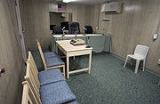
Allal Ab Aljallil Abd Al Rahman Abd
Encyclopedia
Mentioned in the "No-hearing hearings" study
According to the study entitled, No-hearing hearingsNo-hearing hearings
No-hearing hearings is the title of a study published by Professor Mark P. Denbeaux of the Seton Hall University School of Law, his son Joshua Denbeaux, and some of his law students, on October 17, 2006....
, Al Rahman Abd's Tribunal was an instance where a detainee had his requests for exculpatory evidence arbitrarily refused, in violation of the orders that established the Tribunals:
Al Rahman Abd wanted his hospital records, which would prove he was in a hospitabl in Jordan when the allegations against him said he was participating in terrorist activities.
The study commented:
Allal Ab Aljallil Abd Al Rahman Abd v. George W. Bush
A petition of habeas corpusHabeas corpus
is a writ, or legal action, through which a prisoner can be released from unlawful detention. The remedy can be sought by the prisoner or by another person coming to his aid. Habeas corpus originated in the English legal system, but it is now available in many nations...
, Allal Ab Aljallil Abd Al Rahman Abd v. George W. Bush -- Civil Action No. 04-CV-1254 (HKK), was filed on
Allal Ab Aljallil Abd Al Rahman Abd's behalf.
In response, on
18 October 2004, James R. Crisfield Jr. the Department of Defense published a dossier of 24 pages of unclassified documents arising from his Combatant Status Review Tribunal.
His "enemy combatant
Enemy combatant
Enemy combatant is a term historically referring to members of the armed forces of the state with which another state is at war. Prior to 2008, the definition was: "Any person in an armed conflict who could be properly detained under the laws and customs of war." In the case of a civil war or an...
" was confirmed by Tribunal panel 9. Most Tribunal dossiers state when the Tribunal convened. His does not.
Legal Sufficiency Review
On October 16, 2004 James R. Crisfield Jr., one of the Office for the Administrative Review of Detained Enemy Combatants' Legal Advisors, commented in his Legal Sufficiency Review, on the Tribunal PresidentTribunal President (CSRT)
The Combatant Status Review Tribunal the US Department of Defense commissioned, like the Tribunals described in Army Regulation 190-8, which they were modeled after, were three member panels, led by a Tribunal President.-History of the Tribunals:...
's ruling that the hospital records he requested, that would show he was mentally ill, and traveled to Afghanistan for medical treatment, were not reasonably available. He commented that the ruling that the request was not "timely" was within the Tribunal President's jurisdiction. But he disagreed that the medical records could not have changed the Tribunal's conclusion.
Detainee election form
His Personal Representative (CSRT)Personal Representative (CSRT)
The Personal Representative is an officer who serves before the Combatant Status Review Tribunals, convened for the captives the United States holds in extrajudicial detention in the Guantanamo Bay detention camps, in Cuba.-History of the Tribunals:...
met with him for twenty five minuteson 27 September 2004.
|
Unclassified summary of basis for Tribunal decision
In the conclusion to the Unclassified summary of basis for Tribunal decision the Tribunal President stated:| a. | The detainee was mentally and physically capable of participating in the proceeding. No medical or mental health evaluation was deemed necessary. |
| b. | The detainee understood the Tribunal proceedings. He asked questions regarding his rights and hearing procedures and actively participated in the hearing, verbally sparring with the Tribunal President at every opportunity and giving every impression that he is an intelligent individual with a clear understanding of his situation. |
| c. | The detainee is properly classified as an enemy combatant and is a member of or affiliated with al Qaida. |
First annual Administrative Review Board
A Summary of Evidence memoSummary of Evidence (ARB)
Counter-terrorism analysts prepared a Summary of Evidence memo for the Administrative Review Board hearings of approximately 460 captives in the Guantanamo Bay detention camps, in Cuba from December 2004 to December 2005.-Release of the memos:...
was prepared for Allal Ab Aljallil Abd Al Rahman Abd's first annual Administrative Review Board, on 24 March 2005.
The following primary factors favor continued detention
The following primary factors favor release or transfer
Transcript
Abd al Rahman chose to participate in his Administrative Review Board hearing.The Department of Defense
United States Department of Defense
The United States Department of Defense is the U.S...
released a nine page summarized transcript of his hearing.
He prepared a 10 point response to the factors favoring his continued detention.
Second annual Administrative Review Board
A Summary of Evidence memoSummary of Evidence (ARB)
Counter-terrorism analysts prepared a Summary of Evidence memo for the Administrative Review Board hearings of approximately 460 captives in the Guantanamo Bay detention camps, in Cuba from December 2004 to December 2005.-Release of the memos:...
was prepared for Allal Ab Aljallil Abd Al Rahman Abd's second annual Administrative Review Board, on 15 February 2006.
The memo listed factors for and against his continued detention.
The following primary factors favor continued detention
The following primary factors favor release or transfer
Military Commissions Act
The Military Commissions Act of 2006Military Commissions Act of 2006
The United States Military Commissions Act of 2006, also known as HR-6166, was an Act of Congress signed by President George W. Bush on October 17, 2006. Drafted in the wake of the Supreme Court's decision on Hamdan v...
mandated that Guantanamo detainees were no longer entitled to access the US civil justice system, so all outstanding habeas corpus petitions were stayed.
Boumediene v. Bush
On June 12, 2008 the United States Supreme Court ruled, in Boumediene v. BushBoumediene v. Bush
Boumediene v. Bush, 553 U.S. 723 , was a writ of habeas corpus submission made in a civilian court of the United States on behalf of Lakhdar Boumediene, a naturalized citizen of Bosnia and Herzegovina, held in military detention by the United States at the Guantanamo Bay detention camps in Cuba...
, that the Military Commissions Act
Military Commissions Act of 2006
The United States Military Commissions Act of 2006, also known as HR-6166, was an Act of Congress signed by President George W. Bush on October 17, 2006. Drafted in the wake of the Supreme Court's decision on Hamdan v...
could not remove the right for Guantanamo detainees to access the US Federal Court system. And all previous Guantanamo detainees' habeas petitions were eligible to be re-instated.
Habeas corpus petition re-initiated
Adnan Farhan Abdul Latif had a request for his habeas petition to be re-instated.On August 15, 2008 Marc D. Falkoff filed an "emergency motion to compel access" to his medical records.
The motion stated:
|
Adnan Farhan Abdul Latif's attorney's emergency motion stated that he was suffering seizures, and was not being properly treated. The items in the petition for "miscellaneous relief" was for him to be allowed another blanket, and a pillow, to try to help prevent his seizures.
On September 22, 2008 Thomas F. Hogan denied the Emergency Motion for Adnan Farhan Abdul Latif's medical records, pillow and blanket.
Al Jazeera reports on a letter from Guantanamo
On April 17, 2009, Al JazeeraAl Jazeera
Al Jazeera is an independent broadcaster owned by the state of Qatar through the Qatar Media Corporation and headquartered in Doha, Qatar...
reported they had obtained a letter from Adnan Farhan Abdul Latif, in which he described receiving recent abuse at Guantanamo.
The report said the letter, dated April 2009, was addressed to one of his lawyers.
Al Jazeera did not report how the letter came into their custody.
The report also quoted David Remes observations on the appearance of Abdul Latif and his other clients.
Remes said he had taken inventories of new scars and rashes on his clients:
Suicide Attempt

Associated Press
The Associated Press is an American news agency. The AP is a cooperative owned by its contributing newspapers, radio and television stations in the United States, which both contribute stories to the AP and use material written by its staff journalists...
reported on May 11, 2009, that Remes reported that Latif slit his wrists
Guantanamo suicide attempts
On June 10, 2006 three prisoners held by the United States at the Guantanamo Bay detainment camps allegedly committed suicide. The United States Department of Defense stopped reporting Guantanamo suicide attempts in 2002....
during his most recent visit.
Remes said that Latif had used the edge of a strip of broken veneer from the side of a table in the interview room to sever a vein in his wrist.
Remes said Latif used the table to hide his wrist slitting, himself, their interpreter, and camp guards monitoring the interview via video camera.
Remes said Latif had tried to commit suicide before, and had been confined to the detention facility's psychiatric facility.
Remes said Latif needed mental health care, but all camp authorities were doing was attempting to keep him subdued.
See also
- Poems From GuantánamoPoems From GuantánamoPoems from Guantanamo is a collection of 22 poems by 17 Guantanamo detainees published by Marc Falkoff, a US professor of law with a doctorate in American literature.- Contents :* They Fight for Peace, Shaker Abdurraheem Aamer...
- Guantanamo suicide attemptsGuantanamo suicide attemptsOn June 10, 2006 three prisoners held by the United States at the Guantanamo Bay detainment camps allegedly committed suicide. The United States Department of Defense stopped reporting Guantanamo suicide attempts in 2002....
- Guantanamo force feedingGuantanamo force feedingDetainees held in the United States' Guantanamo Bay detention camps have initiated both individual and widespread hunger strikes, and camp medical authorities have initiated force-feeding programs....
External links
- Another Desperate Letter from Guantánamo by Adnan Latif: “With All My Pains, I Say Goodbye to You” Andy Worthington A Cry for Help from Guantánamo: Adnan Latif Asks, “Who Is Going to Rescue Me From the Injustice and the Torture I Am Enduring?” Andy Worthington
- Guantánamo Is “A Piece of Hell That Kills Everything”: A Bleak New Year Message from Yemeni Prisoner Adnan Farhan Abdul Latif Andy Worthington
- Amnesty International's appeal for the release of Adnan Farhan Abdul Latif
- Poems from Guantanamo
- Yemeni Gitmo Detainees Continue Hunger Strike Despite Forced Feeding
- Court Case Illustrates Gitmo's Failure
- Who Are the Remaining Prisoners in Guantánamo? Part Three: Captured Crossing from Afghanistan into Pakistan Andy Worthington, September 22, 2010

